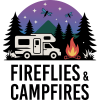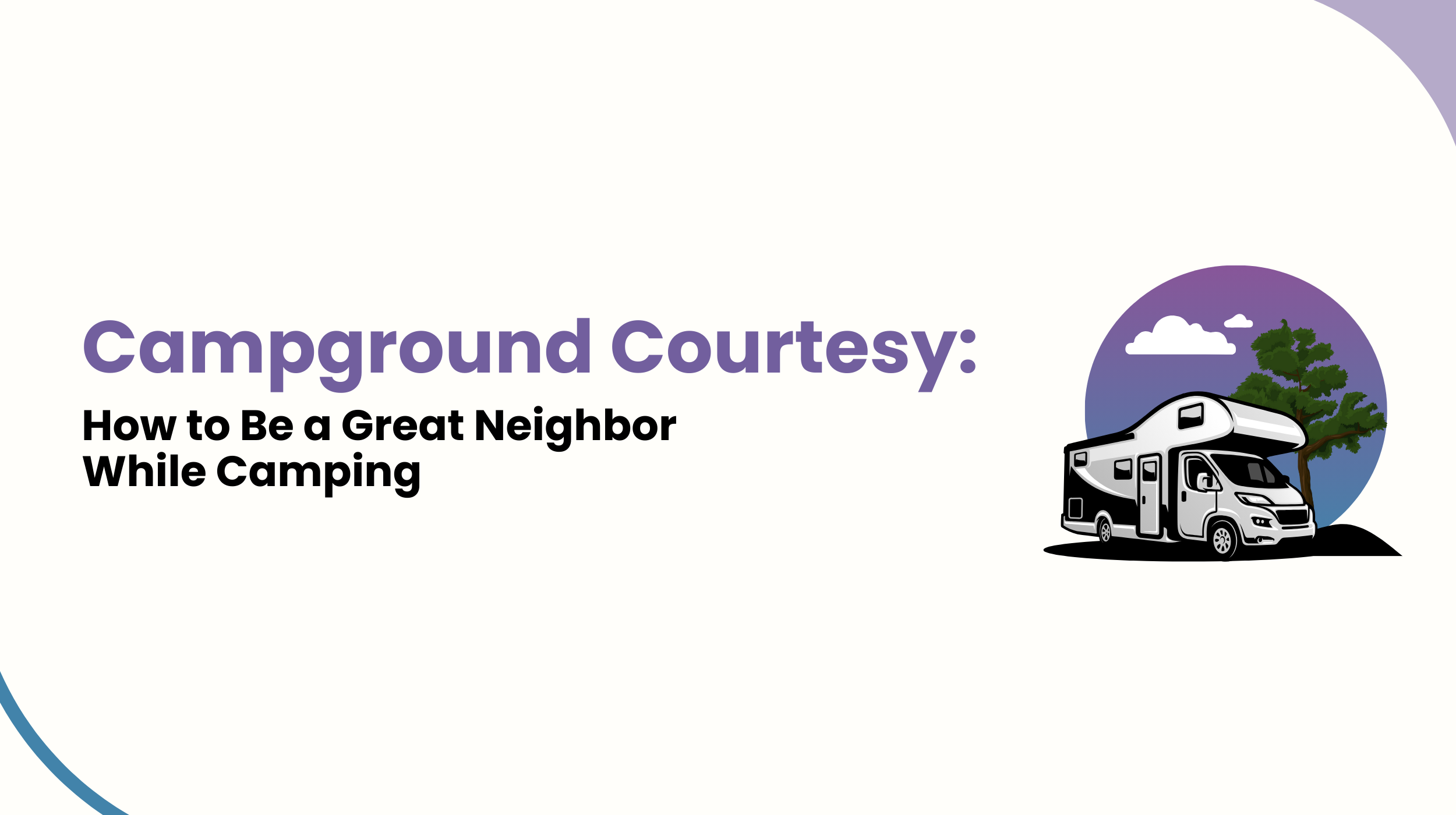Camping is one of the best ways to unplug from the daily grind and reconnect with nature, loved ones, and even yourself. But while you’re out enjoying the great outdoors, you’re also sharing space with other campers, which means good campground etiquette matters. Campground courtesy isn’t about following a long list of uptight rules; it’s about being mindful, respectful, and making sure everyone gets to enjoy their time. Whether you’re pulling into a packed RV park or pitching a tent in a state park, the basics remain the same: respect the posted rules, consider how your actions affect others, and remember that we’re all sharing this little slice of the wilderness. Here’s your guide to being the kind of camper everyone wants as a neighbor.
Follow All Posted Rules and Guidelines
Let’s start with the obvious but often overlooked. Every campground has its own set of rules, which are typically shared during check-in or displayed on signs throughout the park. These aren’t just formalities; they’re in place to ensure safety, fairness, and a positive experience for everyone.
Speed limits, for instance, are usually capped at 5 or 10 miles per hour. That’s not just for kicks—it’s to protect kids riding bikes, pets darting around, and campers walking to the bathroom in the dark. The same goes for fire regulations, which can change daily depending on wind or drought conditions. Ignoring a “no fires tonight” sign because your s’mores cravings are strong is not just a bad look; it’s a safety risk.
Then there are the smaller details that some folks shrug off: no clotheslines between trees, no dumping gray water on the ground, recyclables go here, not there. These details matter. Campgrounds have to balance environmental protection with providing a positive guest experience. When everyone plays by the same rules, the campground stays safe, clean, and welcoming.
One quick example: Paradise Valley Campground in Colorado hands out a simple one-page guide with clear icons and friendly explanations. Everything from “leave wildlife alone” to “only registered guests on-site after 10 PM.” It’s not complicated, but it only works if campers actually read and follow it.
Respect Your Neighbors’ Space
Every campsite is someone’s temporary home, so treat it like a private space. Walking straight through another camper’s setup, even if it’s a shortcut to the bathroom, is a big no-no. Think of it like walking through a stranger’s backyard. It might save you ten steps, but it’s not worth the weird looks or quiet grumbling you’ll get in return.
And it’s not just about where you walk. When you’re setting up your gear, tent, RV, canopy, or picnic area, do your best to stay within your own site boundaries. If you’re staying at a tighter campground like Fort Wilderness at Disney World, where sites are relatively close together, being aware of your space is even more important. Don’t let your outdoor rug roll into your neighbor’s fire pit zone, and don’t block the path with your truck or trailer tongue.
If you’re traveling with kids or pets, this rule matters even more. Teach your kids to avoid running through other campsites, and keep your dog leashed and out of neighboring cookouts. Everyone loves a cute dog until it jumps up and snatches someone’s hot dog off the picnic table.
Keep Common Areas Clean
Campgrounds are like shared neighborhoods, and that includes shared amenities such as bathhouses, laundry rooms, dishwashing sinks, picnic shelters, playgrounds, and even dog parks. The unspoken rule? Leave it better than you found it.
After you’ve rinsed your dishes in the sink, run a little water to clear out any food debris. If you track dirt into the shower, give it a quick rinse before you leave. It’s about courtesy, but it also helps campground staff keep things in better shape. The nicer the facilities, the better the experience for everyone.
Campground restrooms are the most common battleground here. One muddy footprint or wet towel left behind might seem small, but it adds up fast. At campgrounds like KOA’s resort-style properties in places like Moab or Asheville, cleanliness is a huge part of their brand. Guests pay more for the upgraded experience, and that starts with everyone contributing.
If you’re using a common picnic shelter or pavilion for a meal or gathering, be sure to pack out what you bring in. Wipe down tables, throw away trash, and don’t leave leftovers for the squirrels.
It’s a small effort that keeps everyone happy.
Be Kind and Considerate
This one is simple: just be a decent human. Say hi. Smile when you pass someone on the trail. Wave at your neighbor when you’re both sipping coffee at sunrise. Campgrounds are often filled with friendly people, and a small gesture can go a long way toward creating a positive community atmosphere.
That said, not everyone’s looking for new best friends. Some campers are here for solitude and quiet, not group chats around the campfire. You don’t have to knock on every RV door offering s’mores; just be polite, respectful, and aware of the vibe around you.
Still, kindness counts. If you see someone struggling to back in their camper or raise their pop-up tent, and you’re confident they might want help, offer gently. If they wave you off, no hard feelings. If they accept, you’ve just made their evening easier.
It also goes the other way. If someone lends you a hand, be sure to say thank you and return the kindness if the chance arises. Campers tend to remember both the people who helped them and those who played country music until 2 a.m.
What’s the Most Common Campground Complaint?
If you guessed noise, you’re absolutely right. Loud music, generators at weird hours, dogs barking nonstop, kids screaming well past bedtime. These are the kinds of things that get campers packing up early or swearing never to return.
That’s why most campgrounds have quiet hours, usually something like 10 PM to 7 AM. These aren’t just suggestions, they’re for real. If you’re around the campfire telling stories late into the night, keep your voices low. If you have a generator, make sure it’s quiet and used during daytime hours only.
Another major complaint is that people do not clean up after themselves or their pets. Leaving behind trash, not picking up dog poop, or dumping dirty dishwater in weird places quickly ruins the experience for everyone else.
A third common issue? People cutting through campsites. It seems small, but it’s one of the most frequently mentioned frustrations. Again, treat each site as if it were someone’s home. Respect the invisible boundaries, and you’ll avoid awkward encounters.
In the end, campground courtesy is about more than just rules. It’s about respect. Respect for the park, for nature, and for the people sharing the space with you. Whether you’re a seasoned RV traveler or brand new to tent camping, these unwritten (and written) rules help make every trip smoother.
When you follow the posted guidelines, stay in your space, clean up after yourself, and treat others with kindness, you create a better experience for everyone involved. You’ll enjoy your trip more, your neighbors will enjoy theirs, and the campground staff will appreciate not having to intervene or clean up a mess.
Camping is a community, even if it’s just for a weekend. And when everyone buys into that shared sense of responsibility, we all get to enjoy the kind of trips that turn into lifelong memories.
So go ahead, pack your cooler, pitch your tent, or level your RV. But while you’re soaking in the campfire glow or sipping that morning coffee by the trees, remember that good manners travel well. Be the camper everyone’s glad to have next door.

